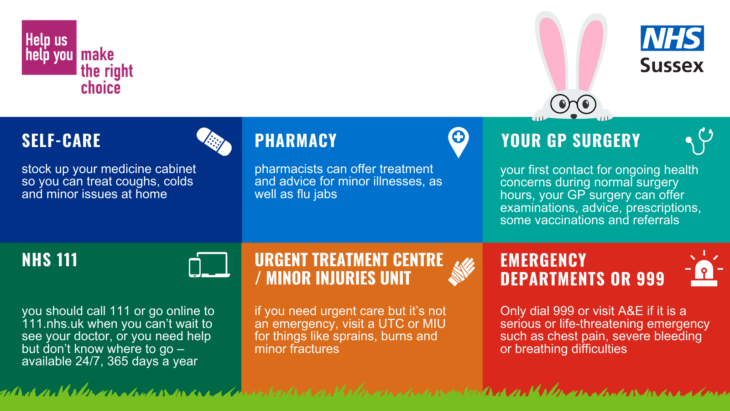The NHS in Sussex is urging people to ‘Help Us Help You’ over the next two weeks with Easter and industrial action ahead.

The Easter period is traditionally pressured for health services with a four-day bank holiday, but with further junior doctor industrial action planned from 11 April 2023, it is expected to be significantly challenging this month.
These strikes are 24 hours longer than March’s action, directly follow the long Easter weekend and are due to take place during school holidays when many medical staff have booked annual leave.
Health and care leaders in Sussex are working together to maintain patient safety, but they are warning that the impact of these strikes will be on a scale significantly beyond that of previous rounds of industrial action.
Emergency and critical care will be prioritised and will continue to be available for those who need it, but with a reduced workforce during the industrial action it is likely that there will be delays for those patients who attend emergency departments but do not have time-critical or life threatening conditions, as well as changes to other services.
NHS leaders are urging the public to support the NHS to help services to manage patient care over the planned strike days. It is important the public play their part and ‘Help Us Help You’ to ensure people can access the care and support they need. Local people are asked to take the following actions:
- To think very carefully about choosing the most appropriate NHS service for your needs and only use 999 and emergency departments for serious or life-threatening emergencies, such as chest pain, severe bleeding or breathing difficulties. For anything that isn’t a life-saving emergency, please use an alternative NHS service and to use NHS 111 as the first port of call either online or by phone.
- To know that if you do need support and care, it may take longer than you might expect to be seen and treated, so please be patient and continue to use the most appropriate service for your needs.
- To please collect family and friends from hospital as soon as they are ready to be discharged, and support the discharge process to available community beds, to allow acute hospital beds to be freed up for those who need them most.
- To stay away from our hospitals if you have symptoms of flu or COVID or have been in contact with someone who has tested positive for COVID-19, unless it is an emergency.
NHS Sussex Medical Director, Dr Amy Dissanayake, said:
“As ever, our priority is to provide high quality NHS care to our local communities, patients, families and carers. To help us to achieve this, it is vitally important that we all know how they can access help and support should they need it over the next two weeks. The NHS in Sussex and our partners have put a range of measures in place to ensure that those most unwell can get the care they need, but we do need the public’s help.
“Using alternative services to A&E when it isn’t a life-threatening emergency will ensure that emergency departments are available for those most unwell. Last month, during the previous junior doctor industrial action, the emergency departments in Sussex continued to see high numbers of attendances – on some days even higher than the week before when no strikes were taking place – and many people could have been treated elsewhere. At a time when many doctors were on strike this was extremely challenging.
“Patient safety is our absolute priority and all health and care partners are working hard together to only make changes to services and appointments where we absolutely need to, but we are asking for the public to help us help you over the coming weeks.”
Plans have been put in place for over the Easter period and during industrial action including:
- Community response teams who can support people in their own homes and avoid a hospital admission where possible;
- Ensuring access to ‘virtual wards’ which are providing out of hospital care and supporting people so that they do not need to go to hospital in the first place or so they can be discharged sooner;
- Focusing on discharge this week so people who are medically ready to leave hospital are able to do so.
Planned appointments, clinics and surgery will be affected but people are being urged to continue to attend their appointments unless they are contacted directly by the NHS.
Patients also do not need to contact their NHS service or team in advance, the team will contact patients directly if an appointment needs to be rescheduled.
Pharmacies, walk in centres, minor injury units and urgent treatment centres will continue to be available. These are open during the industrial action and can help people with a range of injuries and illnesses. See the full list of open services.
